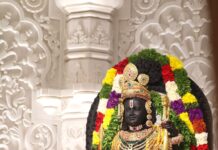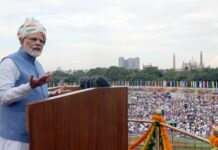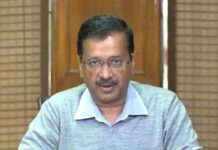New Delhi (IANS): Prime Minister Narendra Modi Friday unveiled his vision for a new, clean and prosperous India in his maiden and stirring Independence Day address from the Red Fort which won him accolades across the country.
Delivering an unusually different Aug 15 speech, Modi, who took office only May 26, spoke from the heart in Hindi for around 75 minutes on a range of subjects, announcing a series of initiatives aimed at empowering the common man and calling for a decade-long moratorium on all violence.
He also called investors around the world to make India a manufacturing hub – “Come and Make in India!” – and unleash a Digital India in which e-governance would play a key role.
Modi announced an end to the Planning Commission, set up in 1950, and said a new institution would replace it.
The 63-year-old prime minister referred to the country’s sages and Vedic wisdom as he called upon Indians to “refine and rebuild the national character”. He also spoke frankly about ills plaguing India.
Tens of thousands from all walks of life trooped to the Red Fort to hear Modi who, wearing his trademark beige colour half-sleeve kurta pyjama with a polka-dotted orange turban, reached the 17th century monument after paying homage to Mahatma Gandhi at Raj Ghat.
The crowds kept cheering hailing Modi, a Bharatiya Janata Party veteran who led his party to a stunning electoral victory in May to give India its first ruling party in three decades with a majority in the Lok Sabha.
Once his speech got over, citizens in city after city spoke effusively of Modi’s speech, calling it inspiring and electrifying.
Modi announced a “Clean India” campaign from Oct 2, Mahatma Gandhi’s birthday, to make the country clean and hygienic by 2019, the 150th birth anniversary of the Mahatma.
“I want to make a beginning today itself — all schools in the country should have toilets with separate toilets for girls,” he said. He said people must resolve “not to leave a speck of dirt in our village, city, street, area, school, temple, hospital and what have you by 2019”.
For a political leader accused of being divisive, Modi called for an end to “the poison of casteism and communalism”, asking: “How long these evils will continue? Whom does it benefit?
“We have enough of fights, many have been killed. Friends, turn back and you will find that nobody has benefited from it. Except casting a slur on Mother India, we have done nothing.”
Modi gave credit to all his predecessors and earlier governments for India’s progress and vowed to move ahead with a strong consensus.
Modi referred repeatedly to issues concerning women, saying the rising incidents of rape made Indians hang their heads in shame. He called for an end to female foeticide, and said daughters were more loyal to parents.
Pointing out at the skewed sex ratio, he asked: “Who is causing this imbalance? Certainly not god. I request doctors not to kill the girl child growing in the womb of a mother just to line their own pockets.”
The prime minister appealed to the world to turn India into a manufacturing hub, asking global investors to “Come, Make in India” and “Come, Manufacture in India.”
He also urged small entrepreneurs to produce more but without compromising on quality and without spoiling the environment.
A votary of technology, Modi spoke in favour of a Digital India.
The prime minister announced a Pradhanmantri Jan-Dhan Yojana to ensure that each poor family had a bank account, a debit card and was insured for Rs.1 lakh [Rs.100,000].
He announced a new initiative under which each MP would develop a model village in his/her area.
The “Saansad Adarsh Gram Yojna” would be launched Oct 11, the birth anniversary of reformer and political leader Jayaprakash Narayan. “After that every MP has to develop at least five villages” over five years.
For the first time in years, there was no reference to Pakistan in an Independence Day speech. Indeed Modi made no mention to any country except neighbouring Bhutan and Nepal which he recently visited.
Before beginning the address, Modi — in a departure from convention — took salute from the armed forces. He spoke mostly extempore, occasionally looking down for a peek at his notes.
Lending a personal touch, the prime minister hailed Indian democracy for allowing a person from “a poor family, an ordinary family” to assume the country’s top post.
“I stand before you today not as the prime minister but as the Pradhan Sevak (Prime Servant).” The remark drew thunderous applause.













